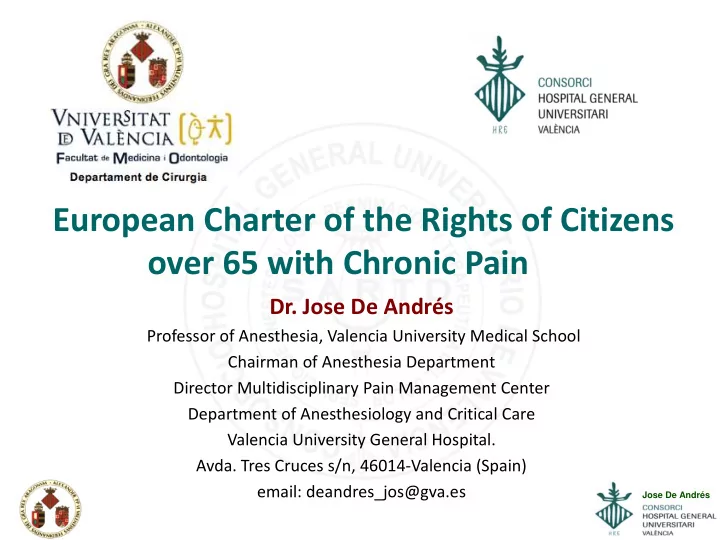

European Charter of the Rights of Citizens over 65 with Chronic Pain Dr. Jose De Andrés Professor of Anesthesia, Valencia University Medical School Chairman of Anesthesia Department Director Multidisciplinary Pain Management Center Department of Anesthesiology and Critical Care Valencia University General Hospital. Avda. Tres Cruces s/n, 46014-Valencia (Spain) email: deandres_jos@gva.es Jose De Andrés
Aging takes a toll… In the PNS: Loss of myelinated and unmyelinated fibers Axonal atrophy common Nerve conduction and endoneural blood flow are reduced w/ age Less nerve regeneration observed Progressive loss of serotonergic & noradrenergic neurons in the superficial lamina of the spinal dorsal horn, and bc serotonin and norepinephrine have important roles in the descending inhibitory control pathways, such a loss may upset natural endogenous pain-suppressing mechanisms Therefore, pain treatment of the elderly obviously differs from that of young patients! Jose De Andrés
Models of the prevalence of pain 1- Pain increases with age and then decreases at older ages (ie, 70 and beond). They suppose that this pain typically has a mechanical etiologic component and possibly is assoc with the occupational envioroment 2- pain increases with age . This has a mechanical etilogic component but also an assoc with increasing prevalence of degenerative dz, particulary at older ages. 3- age-independent pain that (obviously) lacks a mechanical etiologic component. (ie- risk factors that are constant throughout the life course) 4- A decrease in pain prevalence at older ages . It is not clear whether the trajectory is caused by age-related changes in pain and pain perception, or by changes in pain reporting. Jose De Andrés
CRITICAL POINTS • Not all European citizens are aware of specialized pain management centres and even when these centres exist, patients do not know because they are not correctly informed • No care pathways for patients with chronic pain (elderly or not) involving general practitioners, nurses, specialists, pain specialists, caregivers and patients • No European network of hospitals for the treatment of chronic pain yet, and with the entry into force of the EU Directive n. 24 of 9 March 2011 on cross-border care, this deficiency is more pronounced than ever • No guaranteed access to health care and continuity of care in all EU countries • No acknowledgment of pain assessment in the elderly as the fifth vital sign to be identified and monitored in every health care setting. Jose De Andrés
CRITICAL POINTS • No recognition of chronic pain as a possible cause of disability • No shared best practices and guidelines on chronic pain in the elderly Europe-wide • No projects and research on the perception of pain in the elderly and the specific problem of pain in people with cognitive disorders • No projects and research on pain management • No prioritising of pain-management research into the European Horizon 2020 research program • No European references for undergraduate and postgraduate pain-management education for all health care professionals. Jose De Andrés
Overview on a European Union Level • European Union recognizes – In the art. 25 of the Charter of Fundamental Rights of the EU (Charter of Nice, Official Journal 2000 / C 364/01 of 18/12/2000 p. 0001- 0022) the rights of the elderly: "The Union recognizes and respects the rights of the elderly to lead a life of dignity and independence and to participate in social and cultural life". – In the art. 35 the right to protection of health : “ Everyone has the right of access to preventive health care and benefit from medical treatment under the conditions established by national laws and practices. In the definition and implementation of all Union policies and activities shall ensure a high level of protection of human health ” • It is stressed those rights are fully binding on the EU institutions and the Member States with the entry into force of the Lisbon Treaty and the Charter of Nice takes the same value as the Treaties. Jose De Andrés
Overview on a European Union Level • In addition, an important milestone as the "European Charter of Patients' Rights" (published by Active Citizenship Network, 2002) clearly sets out the following rights: – The right to preventive measures , – the right to access , – the right to information , – the right to consent , – the right to freedom of choice , – the right to privacy and confidentiality , – the right to respect of patients' time , – the right to respect of quality standards , – the right to security , – the right to innovation , – the right to avoid unnecessary suffering and pain , – the right to a personalized treatment , – the right to complain , Jose De Andrés – the right to refund .
Jose De Andrés
Recommend
More recommend